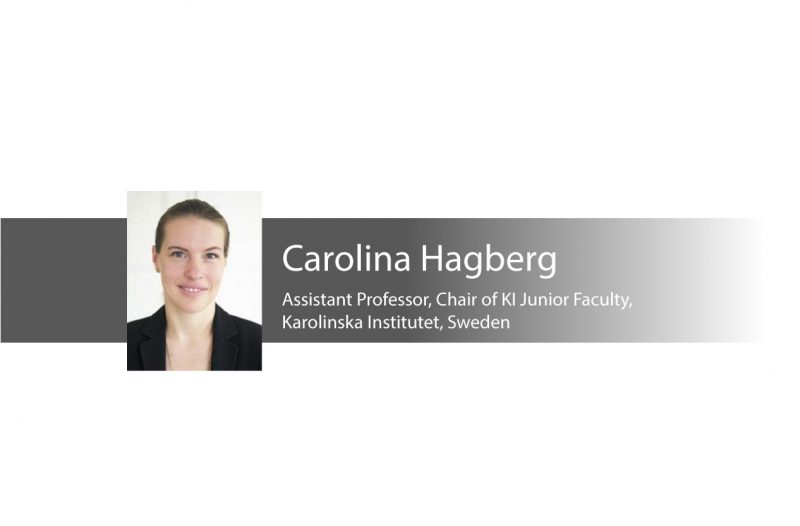
“Be proactive and have a good mentor” – Career path of Carolina Hagberg
Name: Carolina Hagberg
Did PhD at: Karolinska Institutet, Sweden
Current position: Assistant Professor, Chair of KI Junior Faculty, Dept. of Medicine, Karolinska Institutet, Sweden
Interviewed and written by: Maria Manti
Carolina Hagberg is Assistant Professor at the Cardiovascular Medicine Unit at Karolinska Institutet (KI). She has recently established her own research group (Hagberg Lab) that studies the mechanisms involved in adipocyte nutrient uptake and energy metabolism in the healthy and obese state.
Carolina, originally from Finland, came to Sweden 15 years ago to conduct research as part of her undergraduate studies, and since then she has achieved a very successful academic career at KI.
Before starting her PhD studies, Carolina had already received her first project grants and been a part of several research groups in Stockholm, Paris, and Canada. During a summer internship at KI, she found out about an opening of a PhD position at the group of Professor Ulf Eriksson.
By the end of her Master thesis project, she was offered this PhD position and she achieved to complete it by being almost exclusively self-funded.
The PhD years to follow were very productive and led to two published papers in the distinguished scientific journal Nature, with Carolina being the first author. “I was lucky enough to be in the right place, the right time! I was also very demanding and impatient, traits that helped me a lot to accomplish my goals”, she says. Carolina had a very good and supportive team, but at the same time, she was working independently to a high degree, which helped her a lot in her academic career later on.
Challenges and opportunities after the PhD
After the PhD, she knew that she wanted to continue performing research in an academic setting. Doing a postdoc abroad was an important move for her academic progression, so she started searching for research groups in Europe and at the same time she applied for postdoctoral grants. Carolina selected the Auwerx/Schoonjans group working with metabolic signaling pathways at the École Polytechnique Fédérale de Lausanne (EPFL), and with her academic assets and her own funding, she was offered the position. It was less than a year after the beginning of the postdoc that family issues urged her to move back to Stockholm. “It was a challenging and stressful period”, she says. However, things soon became better, as Carolina had made strategic moves that helped her at this difficult moment. For the postdoc grant (Vetenskapsrådet grant) that she received to go to EPFL, she had been asked to select a mentor in Sweden. As it was proven later on, the mentor choice played an important role in her future career. Once she was back in Stockholm, she arranged a meeting with her mentor, Kirsty Spalding, who at the meeting ended up offering Carolina a new postdoc position in her group.
Small choices can make a big difference, and for Carolina networking and mentorship are extremely important. Being Chair of the KI Junior Faculty for the second year and involved in the organization of the KI mentorship program, Carolina has herself many mentors inside and outside academia. Interestingly, in addition to her academic mentors, she has a mentor that provides her with insight into business and recruitment, as part of a Finish mentorship program. For her, the ideal mentor is someone with who you have good chemistry and discussions, and can dare to challenge your previous thoughts. She also believes that PhD students and postdocs should attend leadership courses and should be offered career orientation options from the beginning of their studies.
Advice to PhD students
According to Carolina, a big challenge in academia is to have enough merits that will take you to the next career ladder. Therefore, she has a piece of advice for the PhD students:
1. Move to different research groups in good institutions. This can boost your career, as you learn new things, receive input and expand your network. Being accepted to good institutions, it could also be a measure of your scientific career “value”.
2. Start applying for your own grants at the very beginning of your research career. Ask your supervisor if you can help in grant revision or in writing their grants in order to get experience.
3. Be brave and ask for input. Always look ahead and be proactive.
Photo: by Johanna Rosenlew
This career portrait was originally written for the PhD course “Career skills for scientists”, organized every spring by KI Career Service. As explained in the introduction post, all participants in the course interviewed PhD holders with an academic or a non-academic career. Have a look in our Career Portrait category for more career paths. Get inspired and learn more about your options for your post-PhD career!
-
That’s great. I looked at your blog

1 comments